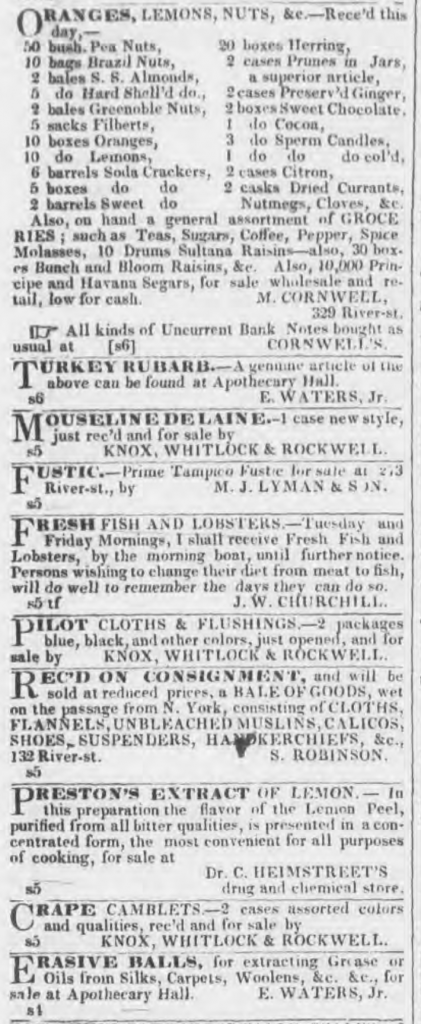 In case you think that in the days before global trade, the Capital District was a wasteland of nothing but Albany beef, beaver pelts and soda crackers, allow this small sampling of advertising from the Troy Daily Whig,1839, to change your mind.
In case you think that in the days before global trade, the Capital District was a wasteland of nothing but Albany beef, beaver pelts and soda crackers, allow this small sampling of advertising from the Troy Daily Whig,1839, to change your mind.
First, an ad from M. Cornwell of 329 River Street. He was offering oranges, lemons, and nuts received that very day. Peanuts, brazil nuts, soft and hard shelled almonds, “greenoble” walnuts, and filberts. He had preserved ginger, sweet chocolate, and cocoa, dried currants, nutmegs and cloves. Ten drums of sultana raisins! Not to mention the Havana segars. Not to mention, “Just rec’d a large and general assortment of Toys, from a Giraffe down to a red Squirrel . . . Also, 30 dozen dressed and undressed Dolls.”
The Apothecary Hall of E. Waters, Jr., was offering Turkey “Rubarb,” more a medicinal article, often a laxative, than a food item. He also sold erasive balls, “for extracting Grease or Oils from Silks, Carpets, Woolens, &c., &c.” And if you needed neither Turkey Rubarb nor erasive balls, perhaps you would care for Odoriferous Compound, “or Persian Sweet Bags – A grateful perfume for scenting clothes drawers, &c., and is an effectual preventative against moths.”
Knox, Whitlock & Rockwell was a dry goods store, run by Jonathan LeGrand Knox, Jonathan Henry Whitlock, and Gould Rockwell. On this occasion, they had a case of the new style mousseline de laine (muslin of wool). They also had pilot cloths (twilled wool with a thick nap) and flushings in blue, black and other colors. Just opened! Also crape camblets, a woven fabric also known as Camelot.
M.J. Lyman and Son, 273 River Street, were offering prime Tampico fustic. Fustic is a species of mulberry, “extensively employed as an ingredient in the dyeing of yellow colors” (according to the Tennessee Pharmacal Gazette, 1874). But they also sold lemon, raspberry and sarsaparilla syrups.
J.W. Churchill was offering fresh fish and lobsters. “Tuesday and Friday Mornings, I shall receive Fresh Fish and Lobsters, by the morning boat, until further notice. Persons wishing to change their diet from meat to fish, will do well to remember the days they can do so.” Churchill wasn’t the only source of fish – L. Mowry of 127 River Street had Connecticut River shad as well as mackerel.
Meanwhile, Dr. Heimstreet’s drug and chemical store had a number of goodies on offer. Preston’s extract of lemon, for example: purified from all bitter qualities, the most convenient concentrated form for all purposes of cooking. He also sold Phinney’s anti-dispeptic “or Family Pills.” And compound fluid extract of sarsaparilla, “the most eligible form in which this valuable medicine can be used.”
That’s just the barest sampling of what was for sale in the Troy shops. There were silver spoons and pearlash, medicinal liquors and twines. Boston rum and compound peach water. Burlaps and dove colored earthen ware. Violin strings and window glass.
